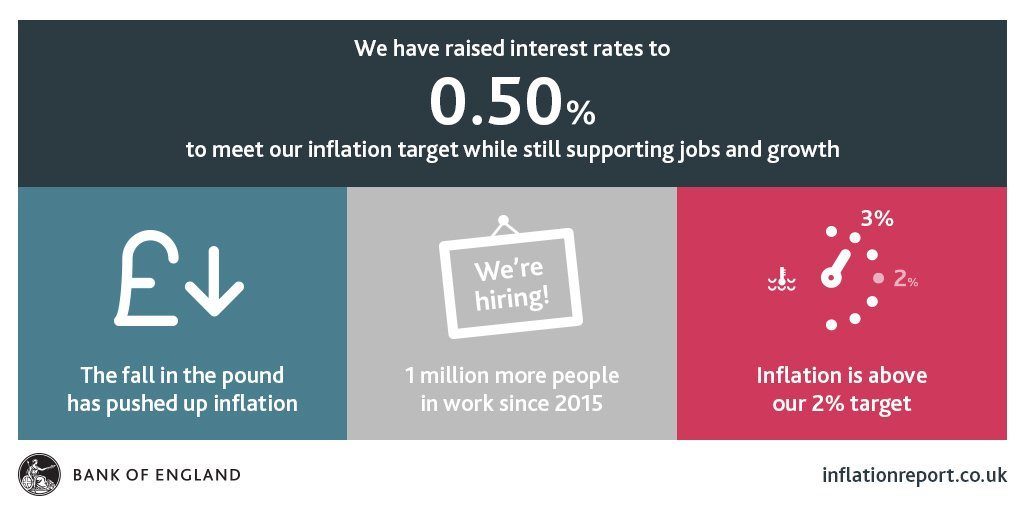For the first time in over 10 years, the Bank of England’s Monetary Policy Committee (MPC) has voted to increase interest rates. On 2 November the MPC increased Bank Rate from 0.25% to 0.5%. The Bank Rate is the official interest rate set by the MPC and it influences other interest rates charged by banks and building societies, as well as the interest rate paid on deposits. During our conversations with organisations in Central Southern England, Florence Hubert and I have been asked by quite a few people to explain why the MPC decided to do this.
To understand why, it is important to remember that Parliament has given the MPC responsibility to keep the rate of inflation – the pace of increases in prices of goods and services measured by the Consumer Price Index (CPI) – at 2% a year. Inflation is currently around 3%. To ensure that the rate of inflation comes back down to the target, a majority of those on the MPC agreed that Bank Rate should increase a little, starting with a rise of a quarter of one percent.
What has the MPC based that judgement on? Well, one positive aspect of the UK economy today is that unemployment is at its lowest level since 1975. Indeed, one million more people are in work than just two years ago. More jobs means more people have money to spend which will help keep consumer demand up. But the very low level of unemployment is also likely to mean that wages will begin to increase more quickly as companies compete to take on new staff and keep their existing workers.
I can see signs of higher wages in my regular conversations with employers across Central Southern England – it is becoming more common for them to say that the next pay rises are going to be a little higher than in recent years. And if wages increase more quickly, then prices in the shops will begin to rise more quickly as well, as companies charge more to pay for staff costs. That means a higher rate of inflation. Also, with so few people now out of work, there isn’t much scope for the economy to grow simply from increasing the size of the workforce.
The main thing that will determine how quickly our economy can grow in the future, or the ‘speed limit’ of the economy, will be the extent to which we are able to produce more with what we have. The MPC thinks that the UK economy is currently growing at around its speed limit. If it were to grow any faster, that would push up on inflation. As a result of these factors, the MPC decided that a small rise in interest rates now is necessary to control inflation in future.
While this will increase borrowing costs for some – for instance, via higher mortgage repayments – we expect the impact to be modest. Many more people are on fixed-rate mortgages compared to the last time there
But the very low level of unemployment is also likely to mean that wages will begin to increase more quickly as companies compete to take on new staff and keep their existing workers.
I can see signs of higher wages in my regular conversations with employers across Central Southern England – it is becoming more common for them to say that the next pay rises are going to be a little higher than in recent years. And if wages increase more quickly, then prices in the shops will begin to rise more quickly as well, as companies charge more to pay for staff costs. That means a higher rate of inflation. Also, with so few people now out of work, there isn’t much scope for the economy to grow simply from increasing the size of the workforce.
The main thing that will determine how quickly our economy can grow in the future, or the ‘speed limit’ of the economy, will be the extent to which we are able to produce more with what we have. The MPC thinks that the UK economy is currently growing at around its speed limit. If it were to grow any faster, that would push up on inflation. As a result of these factors, the MPC decided that a small rise in interest rates now is necessary to control inflation in future.
While this will increase borrowing costs for some – for instance, via higher mortgage repayments – we expect the impact to be modest. Many more people are on fixed-rate mortgages compared to the last time there was an interest rate rise. And, of course, higher rates are better for savers.
The MPC expects that any further rises in interest rates will happen at a gradual pace and to a limited extent. It currently expects that perhaps a couple of additional quarter of a percent increases in Bank Rate are likely to be needed over the next three years.
To assist the MPC, my colleagues and I in the Bank of England’s Agency network will continue to act as ‘the eyes and ears’ of the Bank. We speak to diverse organisations here in Central Southern England and around the UK and we feed what we learn directly into our policymakers in London. You can read the latest summary of our findings here.
In this way, the people and organisations we speak to are helping policymakers to make decisions on how best to guide the economy through these uncertain times.
Andrew Holder is the Bank of England’s Agent for Central Southern England. You can read more about the decision to raise interest rates at www.inflationreport.co.uk.
@BoECentralSouth
